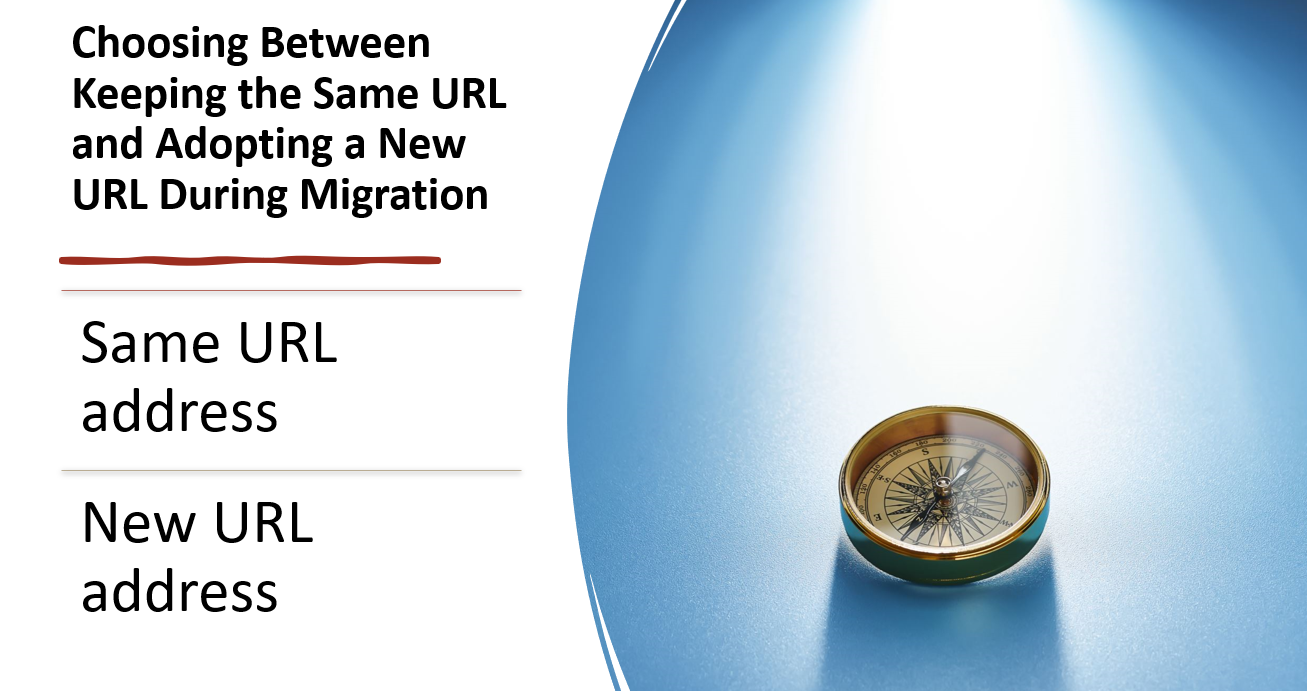Choosing Between Keeping the Same URL and Adopting a New URL During Migration: A Strategic Decision
 Code Sky
Code Sky
Introduction: In the dynamic world of digital transformation, businesses often face the decision of whether to maintain their existing URL or adopt a new one when migrating their online presence. This decision carries significant implications for branding, SEO, user experience, and technical integration. In this blog, we'll explore the benefits and considerations of both approaches to help you make an informed decision during your migration journey.
Keeping the Same URL: Consistency and Continuity
Maintains Brand Equity: Retaining the same URL ensures consistency in your online branding. Customers and stakeholders familiar with your current URL will easily recognize and trust your website, maintaining brand equity and identity.
Preserves SEO Rankings: Changing URLs can disrupt search engine optimization (SEO) efforts. By keeping the same URL, you preserve your existing SEO rankings and avoid potential fluctuations in search engine rankings.
Minimizes User Disruption: Consistency in URL ensures a seamless transition for users. They can continue accessing your website without needing to update bookmarks or inform others of a new web address, minimizing disruption to their browsing experience.
Streamlines Technical Integration: Existing third-party integrations or services configured with your current URL will seamlessly transition to the new environment, reducing the need for reconfiguration and potential compatibility issues.
Saves Marketing Efforts: Promotional materials, advertisements, and marketing campaigns featuring your URL remain relevant and effective. You save time and resources by avoiding the need to update and redistribute marketing materials.
Adopting a New URL: Fresh Start and Strategic Opportunities
Rejuvenates Branding: A new URL provides an opportunity for a fresh start, especially if your current URL no longer aligns with your brand identity or business objectives. It allows you to reposition your brand and communicate a renewed focus or message to your audience.
Enhances SEO Strategy: Migrating to a new URL enables you to optimize your website structure, content, and keywords for improved SEO performance. You can strategically choose a URL that aligns with your target keywords or industry niche, enhancing your search engine visibility.
Clear Differentiation: If your migration accompanies significant changes or rebranding initiatives, adopting a new URL can clearly differentiate the old and new versions of your website. It helps manage user expectations and communicate changes effectively.
Improves Security: Starting afresh with a new URL allows you to leave behind any legacy vulnerabilities associated with the old URL. You can implement modern security measures from the outset, enhancing the overall security posture of your website.
Opportunity for Innovation: Migrating to a new URL presents an opportunity for innovation and experimentation. You can explore new features, technologies, and design elements that align with your evolving business objectives and customer needs.
Conclusion: Making the Right Choice for Your Migration
Whether to keep the same URL or adopt a new one during migration is a strategic decision that requires careful consideration of various factors, including branding, SEO, user experience, and technical requirements. While maintaining the same URL offers consistency and familiarity, adopting a new URL opens up opportunities for rebranding, SEO optimization, and strategic innovation. Ultimately, the choice depends on your business objectives, target audience, and long-term vision for your online presence. By weighing the benefits and considerations outlined in this blog, you can make an informed decision that aligns with your migration goals and drives success in the digital landscape.
Subscribe to my newsletter
Read articles from Code Sky directly inside your inbox. Subscribe to the newsletter, and don't miss out.
Written by

Code Sky
Code Sky
Tech Enthusiast | 19+ Years in IT | Security, Coding, Trends With over 19 years of experience in the ever-evolving world of Information Technology, I’m passionate about staying ahead of the curve. From mastering secure coding practices to exploring the latest trends in AI, cloud computing, and cybersecurity, my mission is to share valuable insights, practical tips, and the latest industry updates. Whether it's about writing cleaner, more efficient code or enhancing security protocols, I aim to empower developers and IT professionals to excel in their careers while keeping pace with the rapidly changing tech landscape.